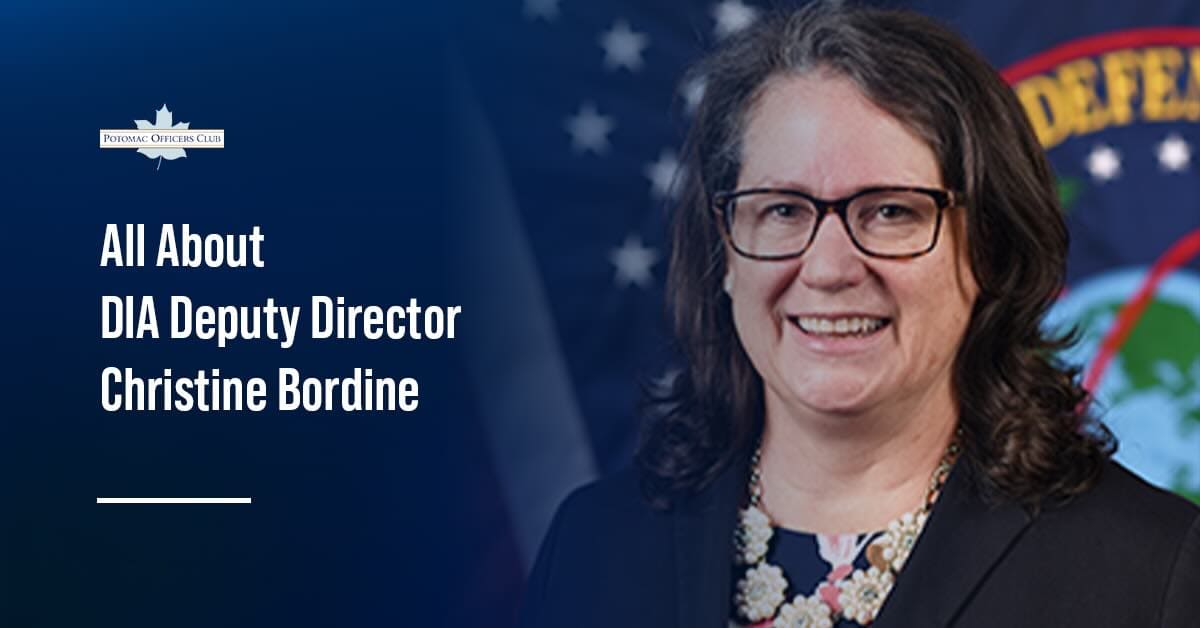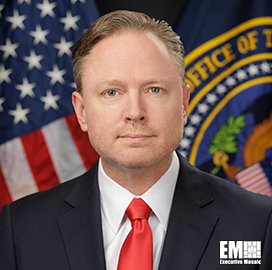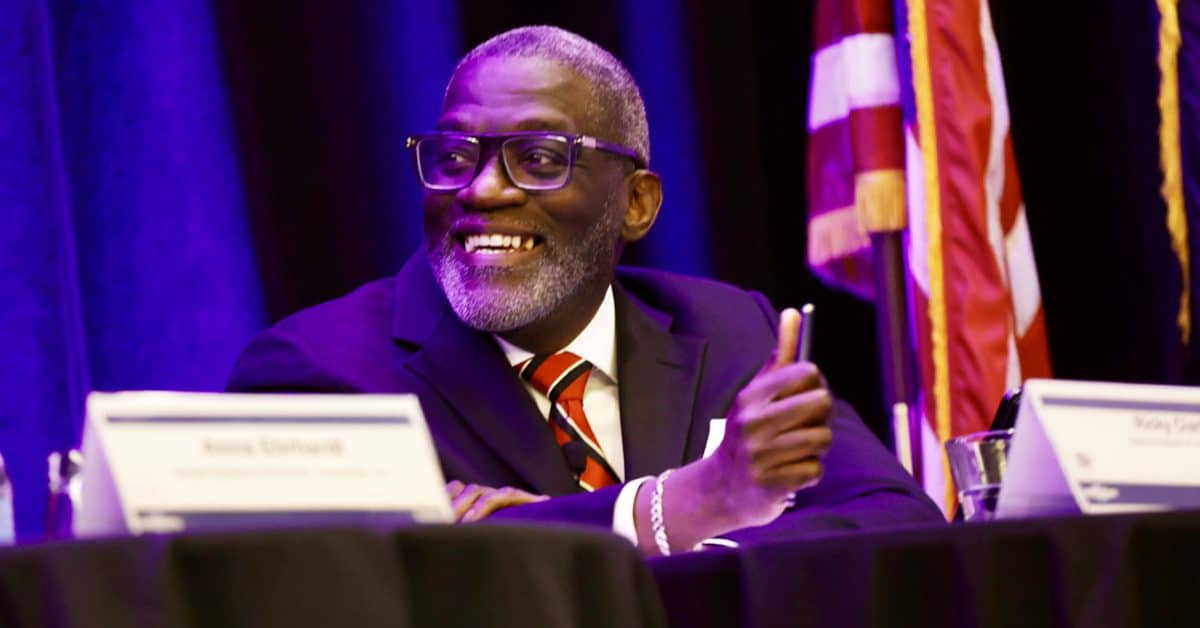
Inside Christine Bordine’s Rise Through the Intelligence Community
When the Defense Intelligence Agency’s top job suddenly opened this month, Christine Bordine became the face of continuity at a sensitive moment for the U.S. intelligence community. The agency’s deputy director briefly stepped into the acting director role after Lt. Gen. Jeffrey Kruse left his post, drawing attention to a career built on technical tradecraft, enterprise leadership and cross-agency experience.
There’s no better place for GovCon industry members to get partnership opportunities for intelligence community work than Potomac Officers Club’s 2025 Intel Summit. The all-day conference will feature keynotes from top IC leaders and expert panels centered on AI, the changing global threat landscape, commercial technologies and much more! Register here now.
Who Is Christine Bordine?
From Voice Analyst to Senior Civilian Leader
Bordine’s rise is the kind of intelligence-career arc that runs from detailed analytic work to enterprise-level management. She began at the National Security Agency as a voice language analyst in 1988 and later earned advanced degrees that helped orient her toward national security policy and leadership. Over more than three decades she has rotated across the Defense Intelligence Agency, the Central Intelligence Agency, the Office of the Director of National Intelligence, U.S. Cyber Command and the National Security Agency. Those moves gave her both technical depth and a broad systems view of how the 18-agency intelligence community operates.
Big Teams, Big Technology, Big Responsibilities
Before returning to DIA, Bordine led major pieces of the NSA enterprise. She served as deputy director of the Directorate of Capabilities, where she oversaw a global, multisector workforce responsible for the information technology infrastructure and services that underpin the agency’s mission. At DIA she is charged with helping run an organization of more than 16,500 civilians and military personnel who provide all-source intelligence and technical insight to warfighters and policymakers.
A Track Record Across the IC
Bordine’s résumé is noteworthy for lateral breadth as well as upward momentum. She has held senior intelligence roles at U.S. Cyber Command and served as vice deputy director for collection management and vice principal deputy director for intelligence integration at DIA. Her experience working in J2 elements at geographic combatant commands and overseas billets, plus time on NATO’s International Military Staff in Brussels, shaped her operational instincts and international perspective. That mix of analytic, technical and operational tours is exactly the profile leaders say they want when the IC needs both detail and coordination.
The Deputy Director Appointment
DIA formally announced Bordine’s appointment as deputy director in July 2024, a move that reunited her with an agency where she had previously held senior integration and collection-management posts. In announcing the hire, Kruse called her “a world-class leader,” underscoring her return to an agency where institutional knowledge matters. The appointment followed a stint at NSA in which she led a global workforce of some 14,000 people in the directorate responsible for capabilities.
A Brief Turn as Acting Director
The world took special notice after reports this month that Kruse would no longer serve as DIA director. The agency named Bordine acting director while officials worked through next steps, a transition that put her temporarily at the very top of the Defense Intelligence Agency during a period of heightened public scrutiny. The move prompted broad reporting across national outlets and signaled the importance of a steady hand at the agency’s helm.
A Voice on Technology & Speed
Speaking at the September groundbreaking for DIA’s Modeling, Analysis, Computing and Exploitation Laboratory Complex in Huntsville, Alabama, Bordine stressed how fast the intelligence mission has become.
“Today we face an existential threat across a multitude of areas and our ability to respond with speed and agility is incredibly important,” she said. “We have gone from having months and years to having minutes and seconds and milliseconds to respond. Technology is not waiting for us to stay aface. Facilities like this and this facility in particular is a crown jewel for DIA and the DIA enterprise because the missile and space intelligence that it delivers provides real, tangible information to our warfighters, it provides real, tangible information to our overseers, to our policymakers to help us understand how to protect the nation and how to protect the values that we all hold so dear.”
Her remarks underscored the urgency that senior IC officials place on computing power, data speed and secure facilities — the very building blocks of defense modernization.
Aaron Lukas on the Same Stage

Also speaking at the event was Aaron Lukas, principal deputy director of national intelligence and set to keynote POC’s 2025 Intel Summit. He highlighted how the new facility’s advanced labs and high-performance computing would bolster U.S. defenses.
“The MACE lab will empower warfighters with intelligence they need to operate effectively in contested environments while equipping national security decision makers with the insights to understand and to respond to the implications of emerging technology,” Lukas said.
His words echoed a consistent IC message: that technology and integration are inseparable from mission success.
Why Bordine Matters Now
Bordine’s profile matters for two reasons. First, she represents continuity inside an agency that supplies crucial military intelligence to warfighters and defense decisionmakers. Second, her background working at the intersection of IT, technical collection and analysis reflects where national security priorities are shifting: toward data, computing and cross-domain integration. As the IC leans more heavily on advanced analytics and secure infrastructure, leaders with both technical fluency and organizational chops become central figures.
Fast Facts
-
Current role: deputy director, Defense Intelligence Agency, with a brief stint as acting director this month
-
Prior assignments: NSA deputy director for the Directorate of Capabilities, deputy director for intelligence at U.S. Cyber Command, vice deputy director for collection management at DIA
-
Workforce experience: led and supported large, multi-thousand person workforces at NSA and across the Defense Intelligence Enterprise

Category: Articles





